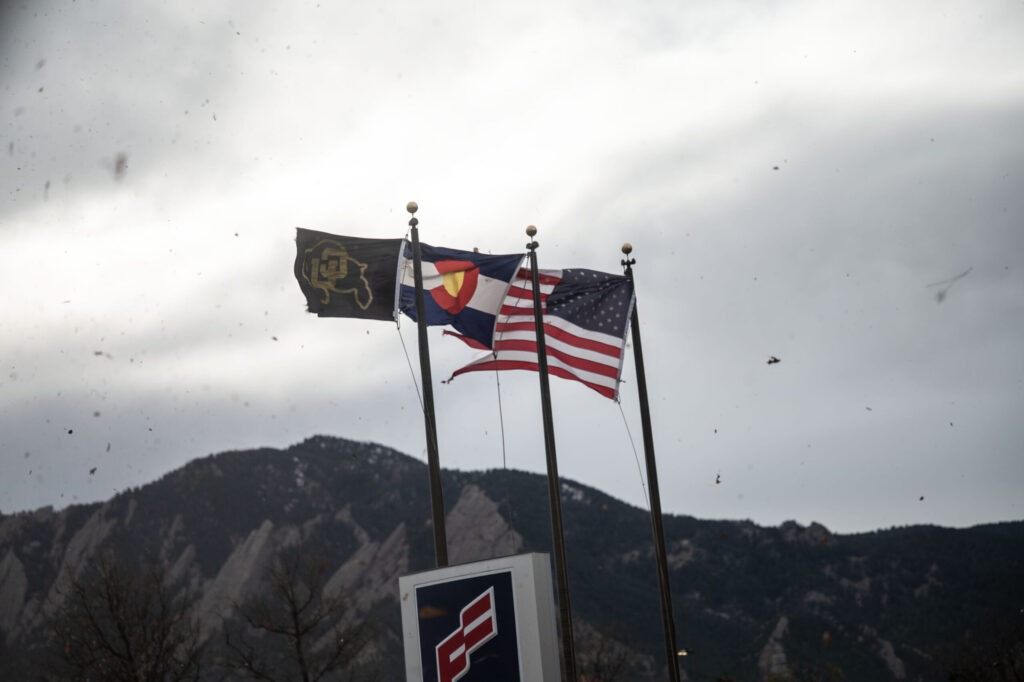Colville Tribes rescind authorization to move wolves to Colorado

Colorado Parks and Wildlife
The Confederated Tribes of the Colville Reservation say they are no longer willing to capture and translocate gray wolves to Colorado from their Washington state reservation.
The announcement is an about-face after Colorado wildlife officials reached an agreement with Indigenous tribes in Washington to release 10 to 15 of the animals in Colorado later this year.
In a letter dated June 6, Colville Business Council Chairman Jarred-Michael Erickson told Colorado Parks and Wildlife Director Jeff Davis that the Tribes were rescinding the original authorization because there had not been enough discussion with those tribes that may be impacted by the operation.
“It has come to our attention that necessary and meaningful consultation was not completed with the potentially impacted tribes,” Erickson wrote. “Out of respect for the sovereignty, cultures, and memberships of Indian Tribes in Colorado and neighboring states, who may be impacted by this project, the Colville Tribes cannot assist with this project at this time.”
A list of resolutions published on June 6 by the Colville Tribes Business Council shows that Tribal Government and Natural Resources Committees voted unanimously to rescind Resolution 2023-752, and documents the council’s concerns with Colorado.
“Based on new information regarding the proposed reintroduction project in Colorado, and that we have now learned that the State of Colorado has failed to consult with the Southern Ute Tribe, the Confederated Tribes of the Colville Reservation cannot agree to the request made by the State of Colorado to provide wolves for this project at this time. It is further recommended that all Directives regarding the request from the State of Colorado that the Tribes provide wolves, that were passed up to the date of this recommendation be rescinded, including, but not limited to those passed on Sept. 19, 2023, and Oct. 3, 2023.”
Colville Confederated Tribes did not respond to the Colorado Politics request for comment.
While the agreement may be rescinded, Colorado Parks and Wildlife spokesperson Rachel Gonzales said it does not close the door to future conversations or opportunities to work with the Tribe.
“While this does change some of the more immediate plans for our reintroduction process, it does not halt our work toward successfully restoring gray wolves in Colorado,” Gonzales said. “We continue speaking with other potential sources of wolves and will take great care in implementing the plan to create a self-sustaining wolf population while minimizing impacts to our landowners, rural communities, and agricultural industries and partners.
“Naturally, the decision made by the Colville Business Council and the Tribal Government and Natural Resources Committees is disappointing, but we have a strong relationship with the Confederated Tribes of the Colville Reservation and hope to continue these conversations in the future,” said Davis in a statement to the press. “We will continue working with other potential sources for wolves to further our efforts to restore wolves to Colorado.”
Wolves are protected by both state and federal law, and Colorado statute specifically directs the Colorado Parks and Wildlife Commission to develop a plan to reintroduce and manage gray wolves in the state.
The state first released gray wolves on the Western Slope on Dec. 18, 2023.
However, the program and its releases have been met with controversy, primarily from farmers and ranchers concerned about the well-being of livestock.
Several of the wolves that the state released in Colorado in December 2023 came from packs with histories of killing livestock. CPW, in its wolf restoration plan, had pledged not to bring in wolves with depredation histories, but the Fence Post’s Rachel Gabel, who is also a columnist for Colorado Politics, reported the first five wolves from Oregon came from the Five Points Pack, which injured one calf and killed another in July of 2023.
The pack also killed a cow on Dec. 5, 2022, and injured a 900-pound yearling heifer on July 17, 2022.
“We are not contemplating halting our implementation of the plan and will continue in our efforts to restore a sustainable population of wolves to the state while avoiding and minimizing impacts to our critically important agricultural industries and rural communities,” Davis said.
Marianne Goodland contributed to this story.

















